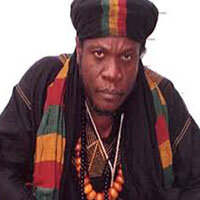Mutaburaka
Jamaican Born Poet Mutabaruka
Mutabaruka (formerly Allan Hope) was born in Rae Town, Kingston on 26th December 1952. After primary education, he attended Kingston Technical High School, where he was a student for four years. Trained in Electronics, he left his first job after about six months and took employment at the Jamaica Telephone Company Limited. During his time at the telephone company, he began to examine Rastafarianism and to find it more meaningful than either the Roman Catholicism of his upbringing or the political radicalism into which he had drifted. In the late 60’s and early 70’s, there was an upsurge of black awareness in Jamaica, in the wake of a similar phenomenon in the United States. Muta, then in his late teens, was drawn into that movement. Illicitly, in school, he read many “progressive books” including Eldrige Cleaver’s Soul on Ice and some that were then illegal in Jamaica, such as The Autobiography of Malcolm X. Mula was the first well-publicized voice in the new wave of poets growing since the early 1970’s. He developed a living relationship between a poet and a fairly wide audience such as, in Jamaica, only Louise Bennett has achieved before the others.
Muta regularly appeared in Swing, a monthly that gave the fullest coverage to the top music scene. Introducing Swing magazine published for the first time a poem by Allan Mutabaruka…The readers were ecstatic. A story common to most black people born in the ghetto…and Muta when writes, it’s loud and clear.
Muta’s first poem shows the depth and capacity for him to have chosen a different path from the one he has and he acknowledges that ‘Two poems I can Write’, one par of which ask: “Can I write of lovers makin’ love in parks with moonshine caressin’ their faces? In the contrasting section of the poem, he states: ‘I write to people bein’ shot down in parks with blood washin’ their faces?
Muta is widely acknowledged as an outstanding oral poet that regularly performs in Jamaica and has captivated diverse audiences abroad. His work, as in that of order ‘dub poets, inequality, racism, class oppression, political deceit, and the baleful influence of powerful nation.


